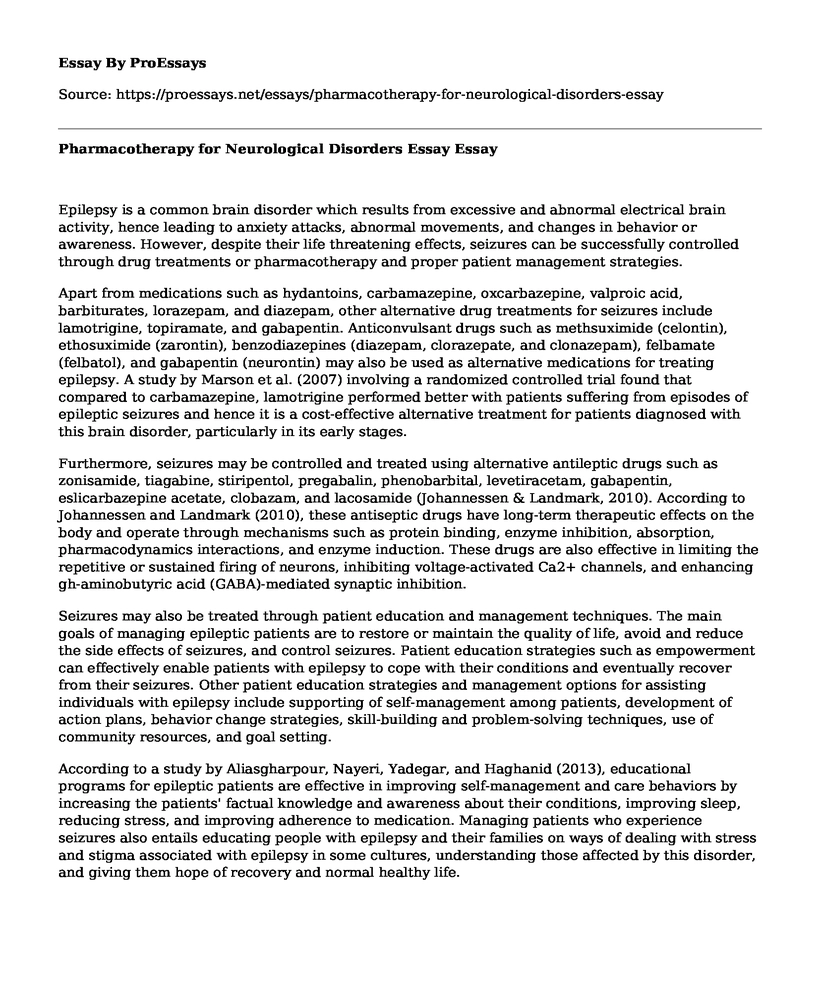Epilepsy is a common brain disorder which results from excessive and abnormal electrical brain activity, hence leading to anxiety attacks, abnormal movements, and changes in behavior or awareness. However, despite their life threatening effects, seizures can be successfully controlled through drug treatments or pharmacotherapy and proper patient management strategies.
Apart from medications such as hydantoins, carbamazepine, oxcarbazepine, valproic acid, barbiturates, lorazepam, and diazepam, other alternative drug treatments for seizures include lamotrigine, topiramate, and gabapentin. Anticonvulsant drugs such as methsuximide (celontin), ethosuximide (zarontin), benzodiazepines (diazepam, clorazepate, and clonazepam), felbamate (felbatol), and gabapentin (neurontin) may also be used as alternative medications for treating epilepsy. A study by Marson et al. (2007) involving a randomized controlled trial found that compared to carbamazepine, lamotrigine performed better with patients suffering from episodes of epileptic seizures and hence it is a cost-effective alternative treatment for patients diagnosed with this brain disorder, particularly in its early stages.
Furthermore, seizures may be controlled and treated using alternative antileptic drugs such as zonisamide, tiagabine, stiripentol, pregabalin, phenobarbital, levetiracetam, gabapentin, eslicarbazepine acetate, clobazam, and lacosamide (Johannessen & Landmark, 2010). According to Johannessen and Landmark (2010), these antiseptic drugs have long-term therapeutic effects on the body and operate through mechanisms such as protein binding, enzyme inhibition, absorption, pharmacodynamics interactions, and enzyme induction. These drugs are also effective in limiting the repetitive or sustained firing of neurons, inhibiting voltage-activated Ca2+ channels, and enhancing gh-aminobutyric acid (GABA)-mediated synaptic inhibition.
Seizures may also be treated through patient education and management techniques. The main goals of managing epileptic patients are to restore or maintain the quality of life, avoid and reduce the side effects of seizures, and control seizures. Patient education strategies such as empowerment can effectively enable patients with epilepsy to cope with their conditions and eventually recover from their seizures. Other patient education strategies and management options for assisting individuals with epilepsy include supporting of self-management among patients, development of action plans, behavior change strategies, skill-building and problem-solving techniques, use of community resources, and goal setting.
According to a study by Aliasgharpour, Nayeri, Yadegar, and Haghanid (2013), educational programs for epileptic patients are effective in improving self-management and care behaviors by increasing the patients' factual knowledge and awareness about their conditions, improving sleep, reducing stress, and improving adherence to medication. Managing patients who experience seizures also entails educating people with epilepsy and their families on ways of dealing with stress and stigma associated with epilepsy in some cultures, understanding those affected by this disorder, and giving them hope of recovery and normal healthy life.
References
Aliasgharpour, M., Nayeri, N.D., Yadegary, M.A., & Haghanid, H. (2013). Effects of an educational program on self-management in patients with epilepsy. Seizure, 22 (1), 48-52
Johannessen, S.I., & Landmark, C.J. (2010). Antiepileptic drug interactions - Principles and clinical implications. Current Neuropharmacology, 8 (3), 254-267
Marson, A.G., Al-Kharusi, A.M., Awaidh, M., Appleton, R., Baker, G.A., Chadwick, D.W., Cramp, C., ... & Williamson, P.R. (2007).The SANAD study of the effectiveness ofcarbamazepine, gabapentin, lamotrigine, oxcarbazepine, or topiramate for treatment ofpartial epilepsy: an unblinded randomized controlled trial. The Lancet, 369(9566), 1000-1015
Cite this page
Pharmacotherapy for Neurological Disorders Essay. (2022, Aug 15). Retrieved from https://proessays.net/essays/pharmacotherapy-for-neurological-disorders-essay
If you are the original author of this essay and no longer wish to have it published on the ProEssays website, please click below to request its removal:
- Essay Example - The Social Model of Disability
- Personal Reflection Essay - Cancer the Monster
- Essay Sample on Nurse Educators: Preparing Future Nurses for Rapidly Changing Healthcare
- Research Paper on Creutzfeldt Jakob Disease: Signs, Symptoms, Causes, and Diagnosis
- Emergency Preparedness: Key to Effective Response in Emergencies - Research Paper
- Nurses: Chemical Impairment Risks to Safety & Patient Care - Essay Sample
- Organize Time Efficiently: Set Clear Goals and Priorities - Essay Sample







